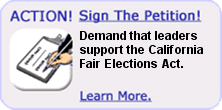
Mercury News editorial: California DISCLOSE Act a must in the era of Citizens United
"I'm Barack Obama, and I approve this message." Voters are
used to that tagline on political ads, and most get the
idea behind the decade-old law requiring it in federal
campaigns. Known as the Stand By Your Ad provision, it
forces candidates to take responsibility for whatever facts
or foolishness their TV commercials contain. Without it,
the mudslinging might be even dirtier.
Shouldn't the same principle apply to political ads made by
people and groups who aren't officially associated with
candidates and ballot measures, but wield just as much
influence in elections?
It should. That's why Californians should encourage state
legislators to support the Disclose Act, a bill by two San
Francisco-area senators that would require the top three
funders of political TV and radio commercials and print and
online ads to be boldly identified in the ads.
No fine print. None of the misleading names that
special-interest groups like to go by. Instead, big, bold
words right up front.
SB52 authors Sen. Mark Leno and Sen. Jerry Hill are right:
Voters can't do much to reduce the money in campaigns, but
they have the right to know which individuals, corporations
or unions it comes from.
The Disclose Act (it stands for Democracy Is Strengthened
by Casting Light on Spending in Elections) -- sponsored by
the California Clean Money Campaign -- is part of the
popular backlash against the loosening of political-donor
restrictions by the U.S. Supreme Court's Citizens United
ruling.
In Sacramento, two other active bills, by Sens. Ted Lieu of
Redondo Beach and Lou Correa of Santa Ana, take different
approaches to helping voters to know who is advocating
what.
But the Disclose Act is the effort with the most support
and the most history behind it.
Similar past attempts in Congress and the California
Legislature have come up short, including a 2012 bill by
then-Assemblywoman (now Rep.) Julia Brownley that was
beaten back by nearly unanimous opposition from
Republicans.
California should lead the way on this reform. We were
among the many voters in the state who were appalled when
an Arizona nonprofit with anonymous backing dropped $11
million into two proposition campaigns. Under the Disclose
Act, an ad mostly paid for by money like that would have to
make clear where it came from.
The 2013 Disclose Act was approved by a 4-1 vote Monday in
the Senate Appropriations Committee. It now will be sent on
to the Appropriations Committee for consideration.
If it reaches the full Legislature, and it certainly
should, it will require two-thirds approval because it's an
amendment to the 1974 Political Reform Act -- passed by
voters.
Californians should tell their lawmakers they approve this
message: SB52 would bring more vital transparency to state
politics.
See the article on San Jose Mercury News website
(In accordance with Title 17 U.S.C. Section 107, this material is distributed without profit to those who have expressed a prior interest in receiving the included information for research and educational purposes.)

